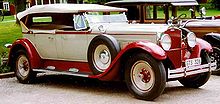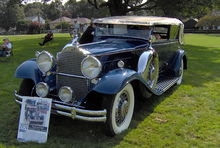Packard DeLuxe Eight
The Packard DeLuxe Eight is the name of a series of eight-cylinder automobiles that the Packard Motor Car Company in Detroit produced between 1929 and 1932. In 1948 the model was revived as a further development of the Clipper Eight and continued to be built until 1950. In 1951 it was replaced by the Packard 200 .
1929-1932
The Eight model , which was built until 1927, was split into the Custom Eight and Standard Eight model series in 1928 . In 1929, a long wheelbase Custom Eight was released under the name DeLuxe Eight.
The DeLuxe Eight, like its shorter counterpart, had an in-line eight-cylinder engine with side-mounted valves, 6306 cm³ displacement (bore × stroke = 88.9 mm × 127 mm) and an output of 105 bhp (77 kW) at 3,200 rpm. The engine power was passed on to a partially synchronized, manual three-speed gearbox and then to the rear wheels via a two-disc clutch. The mechanical brakes worked on all four wheels.
There was only a single chassis with a 3696 mm wheelbase, which could be provided with a wide variety of closed and open bodies for 2-7 passengers.
In the following year, the DeLuxe Eight received a new four-speed gearbox and windows made of unbreakable multilayer safety glass.
In 1931, the engine received a boost in power through modified valves and intake pipes. It now delivered 120 bhp (88 kW).
In the 1932 model year, the wheelbases were extended by 2 ″ to 3619 mm / 3747 mm. By increasing the compression, the engine achieved 135 bhp (99 kW) with the same displacement.
In 1933 the DeLuxe Eight became the Packard Eight again . In the three years from 1929 to 1930, 16,001 DeLuxe Eight were made. In 1931/1932, 2,735 DeLuxe Eight were made (the numbers also include the Individual Custom Eight model).
1948-1950
In 1948 the Packard Clipper Eight was revised and renamed Packard Standard Eight, or Packard DeLuxe Eight.
The car still had an eight-cylinder in-line engine with side-mounted valves, but now with a displacement of 4719 cm³ (bore × stroke = 88.9 mm × 95.25 mm) and an output of 130 bhp (95.6 kW) at 3600 rpm.
There was only one chassis with a 3048 mm wheelbase. A 2- or 4-door sedan with 6 seats each was available as a superstructure.
In 1949 the vehicles were stylistically revised and given a larger rear window. From November 1949 there was a 3-stage automatic transmission ("Ultramatic").
In 1950 the engine increased its output by another 5 bhp and now produced 135 bhp (99 kW).
In 1951 the new Packard 200 replaced this model. In 1948, 75,228 Custom Eights were built, in 1949/1950 there were 89,639 pieces together with the sister model Standard Eight.
Web links
swell
- Beverly R. Kimes (Ed.), Henry A. Clark: The Standard Catalog of American Cars 1805-1942. Krause Publications, 1985, ISBN 0-87341-045-9 .
- John Gunnel (Ed.): The Standard Catalog of American Cars 1946-1975. Krause Publications, 2002, ISBN 0-87349-461-X .


